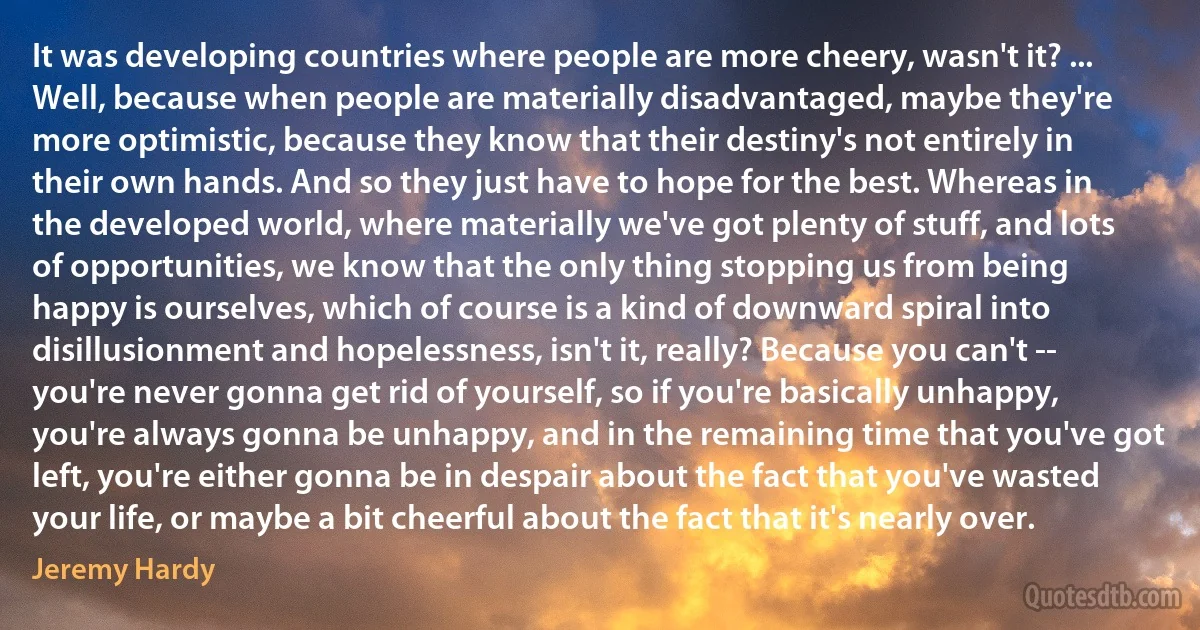
It was developing countries where people are more cheery, wasn't it? ... Well, because when people are materially disadvantaged, maybe they're more optimistic, because they know that their destiny's not entirely in their own hands. And so they just have to hope for the best. Whereas in the developed world, where materially we've got plenty of stuff, and lots of opportunities, we know that the only thing stopping us from being happy is ourselves, which of course is a kind of downward spiral into disillusionment and hopelessness, isn't it, really? Because you can't -- you're never gonna get rid of yourself, so if you're basically unhappy, you're always gonna be unhappy, and in the remaining time that you've got left, you're either gonna be in despair about the fact that you've wasted your life, or maybe a bit cheerful about the fact that it's nearly over.
Jeremy HardyRelated topics
best bit course developing happy hope kind left life people plenty rid spiral thing time unhappy well world hopelessness lots handsRelated quotes
I make that --- twice now, on a Monday I let returning Iraqi injured soldiers come to the premises. The most beautiful people I've ever seen. But they're missing arms and legs, they're with their wives, sometimes they're with their girlfriends. And the tears are coming down the faces of these people. I mean, thousands and maybe hundreds of thousands, and the Iraqis that have been just maimed and killed. This war is a horrible thing. Now, President Bush says he's religious. And yet 400,000 people, the way I count it, have died, and probably millions have been badly maimed and injured. What's going on? What's going on? And the day we pull out it's going to explode. We're keeping the lid on a little bit. It's still a catastrophe, but the day we pull out, because they're in a civil war. Whether we want to admit it or not, they're in a civil war.

Donald Trump
We were all in awe of Penny [Woolcock]. You feel so safe with her, you end up doing things that might seem offensive to other people. It's almost like being in a therapy session. You go a little bit further than you would normally. But in the orgy scene, where Marc's really getting a blowjob, I was like, `You've crossed the line!' Me and Alec were acting, and being loving and safe and showing the feeling of wanting to climb under someone's skin. For it to suddenly become something purely physical - I didn't think that needed to be real. But it was a situation that got out of hand. They filmed it at a swingers' club. There wasn't any way of stopping things, once they'd started. It's really gruesome and awful. But for the story, it's perfect. That scene was out of control. But by that point, so are the characters.

Sienna Guillory
Truly there is no cause for you to be miserable and unhappy. You yourself impose limitations on your true nature of infinite Being and then weep that you are but a finite creature. Then you take up this or that sadhana to transcend the nonexistent limitations. But if your sadhana itself assumes the existence of the limitations, how can it help you to transcend them? Hence I say know that you are really the infinite, pure Being, the Self Absolute. You are always that Self and nothing but that Self. Therefore, you can never be really ignorant of the Self; your ignorance is merely a formal ignorance... Know then that true Knowledge does not create a new Being for you; it only removes your "ignorant ignorance." Bliss is not added to your nature; it is merely revealed as your true and natural state, eternal and imperishable. The only way to be rid of your grief is to know and be the Self.

Ramana Maharshi
the most remarkable piece of reading that you may be recommended to take and try if you can study is a book by Goethe-one of his last books, which he wrote when he was an old man, about seventy years of age-I think one of the most beautiful he ever wrote, full of mild wisdom, and which is found to be very touching by those who have eyes to discern and hearts to feel it. It is one of the pieces in "Wilhelm Meister's Travels." I read it through many years ago; and, of course, I had to read into it very hard when I was translating it (applause), and it has always dwelt in my mind as about the most remarkable bit of writing that I have known to be executed in these late centuries. I have often said, there are ten pages of that which, if ambition had been my only rule, I would rather have written than have written all the books that have appeared since I came into the world.

Thomas Carlyle
It should be clear by now that there are people who can, in fact, be reasonably considered experts; that it is rational to rely, within limits, on ex pert opinion; and that it is possible, by exercising relatively simple criteria, to gain insight into whether a particular expert is reliable or not. It is also true that experts, of course, do make mistakes, and that even the agreement of a large majority of experts in a field does not guarantee that they got it right. That's the nature of scientific truth, as we have seen throughout this book: it is tentative, because it is the result of a human endeavor that is limited both by the type and amount of available evidence and by humans' finite mental powers and emotional reactions. But the examples above show how you can, with a little bit of practice, tell science from bunk!

Massimo Pigliucci
